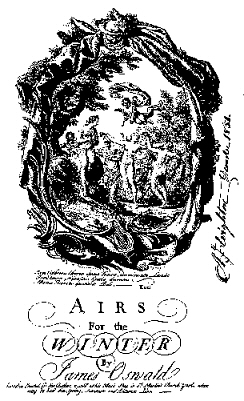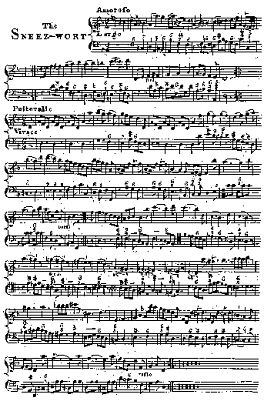b. Crail, Scotland 1711, d. Hertfordshire 1769
Scottish composer and music publisher. Using popular Scottish folktunes, he wrote variations of these for the fiddle and composed other original tunes in the same genre. He published much of his work anonymously or using the nom de plume “David Rizzio”. A “Collection of Minuets” was published in Edinburgh in 1736 and a “Curious Collection of Scots Tunes” in 1740.
In 1741 he left Edinburgh for London and Allan Ramsay lamented this fact in “An Epistle to James Oswald”. In London he eventually set up his own publishing house and published “The Caledonian Pocket Companion”, a collection of Scottish folktunes, some with his own variations. This ran to 15 volumes and many editions.
Like many others whose works feature in the Wighton Collection, he was a member of “The Temple of Apollo”, a secret musical society of composers in London (c.f. Earl of Kelly, John Reid, Charles Burney).
He was appointed chamber composer to George III in 1761. Much research still needs to be done to identify his compositions but he composed with style and talent in both Scottish and classical form, working within the range of his abilities.
Oswald’s “Airs” deserve particular mention. There were once thought to be 48 short trio sonata movements, in four groups of 12, each bearing the name of a flower, but the edition in the Wighton Collection contains two sets for each season. Also in the Wighton Collection is a MS for “Air for Autumn” in the composer’s own hand.
A Collection of 43 Scots Tunes with Variations, particularly adapted for the violin and the harpsichord.
The Caledonian Pocket Companion in 12 Books, containing all the favourite Scotch tunes with variations for the German flute or violin.
Airs for Spring, Autumn, Summer and Winter, in 2 sets.
The Air for Autumn.
MS. in the handwriting of the composer.
Microfiche available.
A Collection of the Best Old Scotch and English Songs set for the voice with accompaniments and thorough bass for the harpsichord.
A Collection of Curious Scots Tunes for a violin, German flute, or harpsichord.
A Collection of Musick by several hands, both vocal and instrumental, most of which never before printed, and now published for the use of the Orpheus’s Clubs, by James Oswald, Dancing Master in Edinburgh.
A Collection of Songs, as they are perform’d at the publick gardens, set to musick by James Oswald, corrected and approv’d, by the Society of the Temple of Apollo.
A Second Collection of Curious Scots Tunes for a violin and German flute, with a thorough bass for the harpsichord.
Collin’s Kisses, set by the late James Oswald Esqr., some time chamber composer to His Majesty, set for the violin, German-flute or harpsichord.
A Curious Collection of Scots Tunes for a violin, bass viol. or German flute, with a thorough bass for the harpsichord, and also a sonata of Scots tunes in 3 parts and some masons’ songs with the words, for 3 voices, to which is added, a number of the most celebrated Scots tunes set for a violin or German flute.
A Second Collection of Curious Scots Tunes for a violin and German flute, with a thorough bass for the harpsichord.
A Favourite Collection of Scots Tunes and Highland Airs, for the violin or German flute, with a bass for the violoncello or harpsichord by W. McGibbon, J. Oswald and others.
The Pocket Companion for the Guittar, containing a favourite collection of the best Italian, French, English and Scots songs, adapted for that instrument and the voice. (Unique).
A Collection of Songs Set to Musick, beginning with “Beauty and Musick;” and ending with “Thy fatal shafts”. (Oswald and others).


Sneez-wort (Airs for Autumn, 2nd Set)
Sneezewort – a species of yarrow (Achillaea ptarmica) once used as a substitute for snuff. White Hellebore
